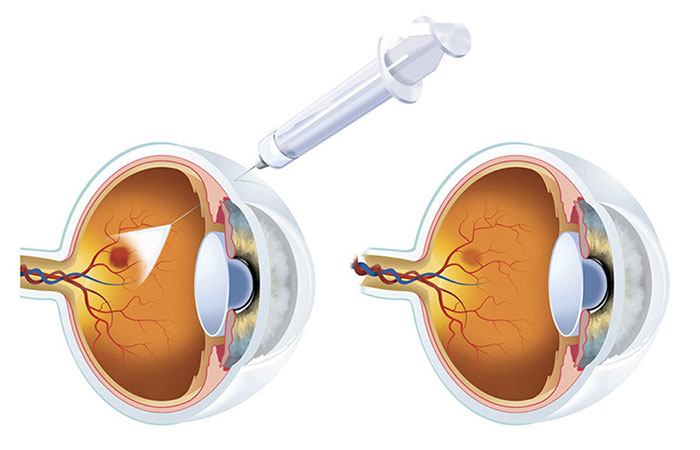Intravitreal Injections
There are many eye conditions, especially retinal conditions that may require
treatment with Intravitreal injection of anti-VEGF and/or Steroids. These conditions
commonly are Age Related Macular Degeneration, SRNVM, Diabetic Retinopathy,
Retinal Vascular blocks, Uveitis, etc. Your treating doctor shall be explaining the
disease you have and which Intravitreal Injection shall be best suited for you.
What are various Intravitreal Injections Available?
The commonly used Intravitreal Injections are Anti-VEGF injections like Ranibizumab
(Lucentis/Accentrix/Razumab), Aflibercept (Eylea), Brolucizumab (Pagenax) and Off
Label Bevacizumab (Avastin and Zybev). The other option is Steroid injections like
Sustained Release Dexamethasone Implant (Ozurdex) and Traimcinolone Acetate.
Is Intravitreal anti-VEGF or Steroid treatment right for me?
Your ophthalmologist (Retinal Specialist) would suggest the best-suited injection for
you. The treatment modality is decided based on the specific disease, the stage of
the disease, the condition of the central retina (macula) and visual acuity. OCT scans
and fundus photographs and fundus angiography etc. assist your retina specialist to
decide on the treatment. These tests would need to be repeated at regular intervals
to monitor the disease and to decide bout further need for injections. Since it is likely
that you would require multiple injections, the cost consideration also plays a role to
decide the right choice of injection for you.
Would I regain my lost vision with the help of these Intravitreal Injections?
Most of the retinal diseases that require Intravitreal injection treatment are serious
diseases and often the vision lost is not regained. The primary aim of the treatment
of these conditions is to maintain the vision, which target is achieved in
approximately 90% of patients, provided proper follow-ups and timely and regular
treatment is carried out.
Moreover, nowadays with better injection options, some degree of improvement in
visual acuity and quality of vision may be expected in many of the patients.
Proper follow-ups and monitoring with the help of periodic tests like OCT,
Fluorescein Angiography etc. is very important and the patient would need to be very
regular with his checkups and treatment, as many of these conditions have a
tendency to recur and decrease the vision later.
How many injections will be required for me?
Most of the cases would require more than one injections. These injections may
need to be repeated at regular intervals (often 4-12 weeks, depending upon the kind
of injection) for a very long time. There are various strategies like PRN, Treat and
Extend, etc. to minimize the number of injections required, without compromising on the efficacy and safety. Your retina specialist would guide you accordingly.
For Anti-VEGF treatment, most patients require a loading course of three injections
at regular intervals of four weeks. As explained earlier, it is of utmost importance that
you maintain a very regular follow-up schedule, so as to monitor the disease and
intervene with necessary investigations and injections and/or laser/surgery at the
right stage to achieve the best results.
The patient and his/her attendants need to be aware about the disease and its
treatment and have to be actively involved in decision making and should be regular
in their follow-ups and treatment to get the best results of this treatment with
Intravitreal injections.



